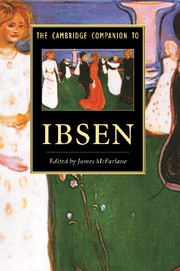Book contents
- Frontmatter
- 1 Ibsen's dramatic apprenticeship
- 2 Ibsen and historical drama
- 3 Dramatic and non-dramatic poetry
- 4 Ibsen and comedy
- 5 Ibsen and the realistic problem drama
- 6 Ibsen and feminism
- 7 The middle plays
- 8 The last plays
- 9 Ibsen's working methods
- 10 Ibsen and the theatre 1877-1900
- 11 Ibsen and the twentieth-century stage
- 12 Ibsen on film and television
- 13 On staging Ibsen
- 14 Ibsen and the drama of today
- 15 A century of Ibsen criticism
- 16 Works of reference
- Index
4 - Ibsen and comedy
Published online by Cambridge University Press: 28 May 2006
- Frontmatter
- 1 Ibsen's dramatic apprenticeship
- 2 Ibsen and historical drama
- 3 Dramatic and non-dramatic poetry
- 4 Ibsen and comedy
- 5 Ibsen and the realistic problem drama
- 6 Ibsen and feminism
- 7 The middle plays
- 8 The last plays
- 9 Ibsen's working methods
- 10 Ibsen and the theatre 1877-1900
- 11 Ibsen and the twentieth-century stage
- 12 Ibsen on film and television
- 13 On staging Ibsen
- 14 Ibsen and the drama of today
- 15 A century of Ibsen criticism
- 16 Works of reference
- Index
Summary
The title of this chapter might seem paradoxical, even a contradiction in terms. The forbidding seriousness of Ibsen's later works has become a legend, especially to those who know them mainly by repute. Yet the earliest of his plays to deal with contemporary social realities were all classed as comedies; to understand how he developed as an artist - and as a social critic - it is essential to know something about the ways in which he approached and adapted the conventional comedy of his day.
It is as well to remember at the outset that the term 'comedy', even leaving aside its more specialized modern uses and more general older meanings, is an equivocal one. It has been used to denote a tone of voice or mode of perception (something 'light' or 'amusing'); it can indicate a special kind of dramatic plot, a 'happy end' with the blend of assurance and strain which that can imply; and it can suggest a specific subject-matter - in Jonson's words 'an image of the times' which deals 'with human follies not with crimes'. In much classic comedy - in Shakespeare or Molière or Holberg - all three of these senses may apply. But there is no logical reason why, in all circumstances, they should. The appalling may also be funny, without suggesting redemption or a happy end; human follies can also be crimes. One could read Ibsen's entire œuvre as a deconstruction of the various, always potentially divergent, elements of what is classed as comedy.
- Type
- Chapter
- Information
- The Cambridge Companion to Ibsen , pp. 58 - 67Publisher: Cambridge University PressPrint publication year: 1994



